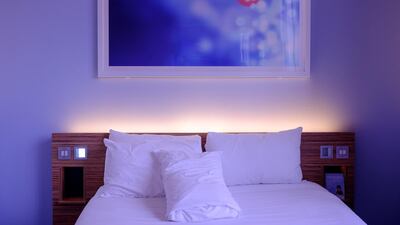I’m no technophobe, but having stayed in two five-star hotels in Abu Dhabi in the past month, I’m sorry to report that my previously long list of hotel hates has only grown longer and more detailed. As technology becomes more ambitious and ubiquitous, so do the pitfalls, and there’s nothing like a new or “upgraded” hotel to make you feel like you’re at best part of the testing process, and at worst a hapless victim in a game of random persecution.
Of course, it all looks good when you are shown the room; the problems only surface later when you have fully unpacked and, usually, got settled into bed. It then becomes clear that whatever staff member escorted you to this place has never spent a night there, and neither have the management staff who greeted you so smugly in the lobby, restaurant or beside the pool, asking how your stay is going almost as if to rub it in.
Last weekend, it went like this. A friend and I were pleased with our twin room: it had comfortable beds and great views. Yet the first red flag occurred after sunset, when we realised that the curtains wouldn’t close either with or without pressing on a supposedly multifunctional panel (one of which glowed so brightly in the night it had to be covered up with some dark-coloured undergarments).
In our case, there were three of these panels dotted around the room; sometimes they come in the form of flatscreen tablets: also unwelcome if you spend too much of your life behind a screen anyway. These panels and tablets usually at least partly don’t work, an annoyance compounded by the fact that they are ultimately unnecessary. How difficult is it to close the curtains by hand or operate lamps by their switches? And why is one deprived of these simple pleasures?

Of course, the curtains didn’t close fully and an annoying gap stubbornly remained throughout the night, letting in light from the balcony (only one of two would turn off). At the same time, neither of the two lights that we actually needed, the bedside reading lights, worked at all.
Then, throughout the night, the hallway light, which was only supposed to go on when the sensor sensed you were there, flicked on and off randomly. By now I, of course, was wearing my eyemask, but alas this wasn’t enough to stop me being kept awake, especially as the bathroom and dressing room lights also flicked on and off. The next morning, just when lights were no longer needed and I was having a bath, I was treated to two blinding spotlights directly above me.
After calling maintenance, the “engineer” unsuprisingly only fixed the balcony and bedside reading light issues, resulting in an 11pm call on the second night to protest that, yet again, the hallway and bathroom lights were flicking on and off after the so-called master switch had been pressed. Almost as bad was the fact that the air-con control button was confusingly labelled “Auto/Off”, which meant that you could seemingly adjust the temperature, but without any fresh airflow coming in at all. Cue further inability to sleep and a thoroughly unrestful weekend.
I know I’m not the only one suffering this fate – some hotels have even started offering packs of black patches to cover up disturbing panels, and a colleague who checked into a design hotel near London’s Barbican over the summer tells me that after a light panel above her bed would not turn off, the hotel at first refused to move her and told her that it could only be fixed the following day – pointless on a one-night stay. After more maintenance back-and-forth and delay in the middle of the night, my friend was moved to another room and offered a measly 10 per cent discount when she complained the next morning. And the absolute worst thing of all? It was her birthday.
Kudos to those hotels of every grade who embrace the humble switch; a thing of beauty, grace and delight. When will the others see the light?
____________
Read more:
On the move: when hotel 'guests' are anything but
Hotel Insider: The Watergate Hotel, Washington DC
____________

